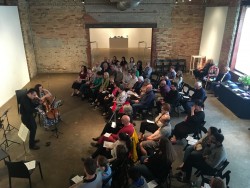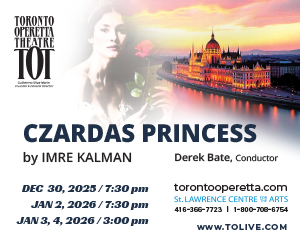
The room’s acoustic was electric with a transparency that generated the immediacy McLeod mentioned to me. The choice of music and musicians undoubtedly contributed as well. The two pieces featured in the concert – Schulhoff’s Duo for Violin and Cello and Schoenberg’s string sextet, Verklärte Nacht (Transfigured Night) – were works that McLeod had long wanted to program. Once he had worked out the logistics of bringing together string players from as far away as Halifax and Winnipeg, he was able to go ahead. The disparate nature of the participants made the Sunday afternoon recital into a kind of mini-festival, with Mark Lee, assistant concertmaster of Symphony Nova Scotia, violinist Elizabeth Skinner of McGill, Keith Hamm, principal violist of the COC, Leana Rutt, assistant principal cellist of the Winnipeg Symphony Orchestra, Julie Hereish, assistant principal cellist of Orchestre Symphonique de Québec, and McLeod himself on viola.
Schulhoff’s Duo for Violin and Cello opened the proceedings. Filled with Czech folk music, rhythms and dance, it was a showcase for the ardent playing of violinist Mark Lee and cellist Leana Rutt. Lee foregrounded the rich variety of sound from exposed and plaintive to jagged and rhythmic, from the earthy power of a Roma-flavoured peasant dance to the sensuality of the agitated finale. Rutt’s cello proved a compliant partner, from bittersweet accompaniment to melodic dialogue, all resoundingly live in the space.
Schoenberg’s Transfigured Night is an intense emotional journey inspired by a poem by Richard Dehmer, in which a woman confesses to her lover that she is pregnant by another man, but over the course of a moonlit walk through a bare, cold wood, the lover tells the woman that he will accept the stranger’s child as his own. The level of sensuality in the music rivals Wagner. The shift to D Major, which echoes the man’s acceptance of his lover’s confession, is a broad stroke of hyper-Romanticism, beginning the transfigurative process that occupies the last half of the work. The door to the gallery from the alleyway was open during the concert and, in a kind of pathetic fallacy, a burst of fresh air entered the space to herald the comforting harmonies that follow this key change. Moody, tense and filled with climactic waves in its first half, the piece settles into a lovely upward figure that rises from the strings to set the tone that all will be well in life and art. It was as if, in going on such a powerful, musically complex journey with this work, Schoenberg had reached the limits of conventional tonality.
All Pocket Concerts include wine and snacks following the music, an intimate impromptu cocktail party that encourages audience and music-makers to interact. So it was I learned that it took only a full day of rehearsal the previous Saturday to prepare for the concert we had just heard; a tribute to the professionalism and musicianship of the performers.
An ad hoc quartet of Hamm, Skinner, McLeod and Hereish performed two encores: arrangements of Nordic folk tunes by the Danish String Quartet. The first, a Danish fiddle tune, flourished in the string quartet format; the second, Peat Dance, had a distinct Scottish feel and an energy which the audience clearly appreciated.
Paul Ennis is the managing editor of The WholeNote.


